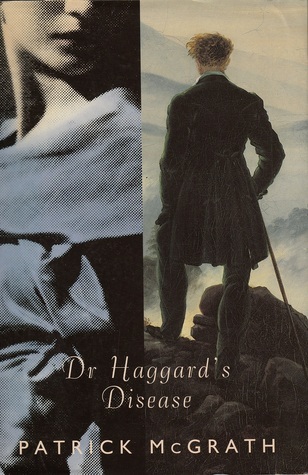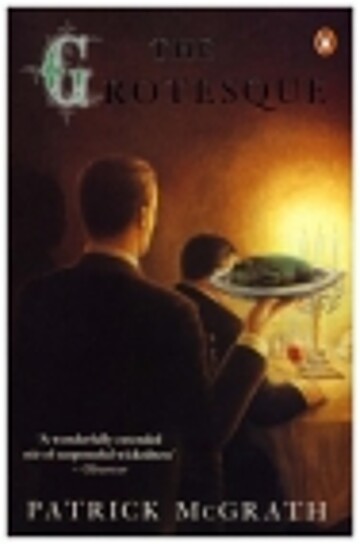For months now, a number of people have been reading Patrick McGrath and talking him up. The novel they’ve usually read is Asylum but, just to be contrary, I thought I’d try a different introduction to the man. Thus I chose Dr Haggard’s Disease, McGrath’s third novel.
Set in pre-war London, the novel is based around a monologue from the eponymous Dr Haggard. Haggard, a general practitioner living in a house on the southern coast of England, is a man who has loved and lost. But, when the son of his former lover pays him a visit old feelings are renewed, former loves remembered, and madness begins to show from beneath the cracks.
Crucial events in Dr Haggard’s Disease, being those that shape the later narrative, happened years before in Haggard’s life when he was a promising young surgeon under the tutelage of Vincent Cushing – a nod perhaps to a couple of actors well known for playing doctors in low-budget horror movies – and under the spell of the senior pathologist’s wife. But it’s the events now, as recalled by Haggard, that drive the narrative on. And, being just ever so slightly mad, there are many moments in which you doubt his version of events, if not everything he has to say. And rightly so. He’s crazy! But ever so poetic with it.
The tone is a modern take on the Gothic, so while there are no clanking chains, ghostly castles, and other supernatural happenings as in previous centuries, there are grim hospitals and dark, rugged coasts with waves crashing against the cliffs. The language here is exemplary and showcases McGrath’s ability to turn a phrase. As an example, one only has to look at the novel’s opening:
I was in Elgin, upstairs in my study, gazing at the sea and reflecting, I remember, on a line of Goethe when Mrs Gregor tapped at the door that Saturday and said there was a young man in the surgery to see me, a pilot. You know how she talks. ‘A pilot, Mrs Gregor?’ I murmured. I hate being disturbed on my Saturday afternoons, especially if Spike is playing up, as he was that day, but of course I limped out onto the landing and made my way downstairs. And you know what that looks like – pathetic bloody display that is, first the good leg, then the bad leg, then the stick, good leg, bad leg, stick, but down I came, down the stairs, old beyond my years and my skin a grey so cachectic it must have suggested even to you that I was in pain, chronic pain, but oh dear boy not pain like yours, just wait now and we’ll make it all – go – away –
It’s testament to McGrath’s ability that he manages to continue this style for nigh on two hundred pages, right up to the gruesome denouement, making the book an absolute delight to read despite the dark subject matter. The characters, while we only have Haggard’s account of them, are strong and easily envisaged – both as the doctor sees them and as we, looking between his words, see them. But however certain Haggard is about his story, as readers our reflections upon them will always be cast in doubt.
As a portrait of a man falling into madness brought about by the ignition of past passions, Dr Haggard’s Disease does no wrong (and if it did, I was too busy enjoying the prose) and its dark tone, tinged with erotica and horror, create an almost perfect novel. Almost, because there were times when I did find the lengthy paragraphs overwhelming, despite their quality. But, now that I’ve joined the ranks of those gushing over McGrath, I know that the next time I need to get away from my usual fare, I’ll be running for Asylum.


I loved this book and I loved “Asylum.” I thought “Martha Peake” was an uneven book, but the first part was wonderful.
I noticed no John Banville among your authors. Have you read him? I think he’s one of the greatest authors writing today. I’d be interested in what you have to say about his work.
I have two John Banville books (The Book Of Evidence and The Sea) on my shelves but have yet to read them. I did originally loan The Sea from the library and got about one hundred pages in but, because it had just won the Booker, it was only on a week loan and I had to return it. In the end I bought it but have not returned to it. Perhaps I should soon as I was enjoying it.
Hello Stewart: I see we agree on Mcgrath. I have a couple of his novels still sitting on my shelf. I hope that they are as good as Dr Haggard’s Disease.